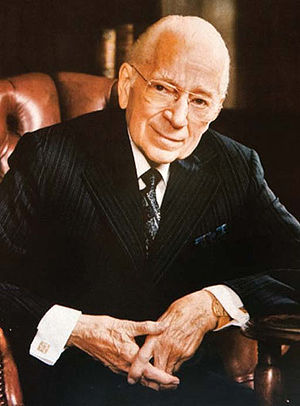
Twenty-five years ago today there was a death that only a few thousand true believers and former true believers even remember, let alone know anything about. There are of course a few specialists — historians of religion and theologians — that would remember this man or know anything about it.
Herbert Armstrong died on January 19, 1986. He was the founder and leader of the church I grew up in, and his death came both as a shock and an expected consequence of age: he was 93 years old.
I remember his death; I remember his life; I find myself compelled to mention it. In that regard, I am hardly alone: there are dozens of bloggers writing about the same thing today. They’re rehearsing for the millionth time how he made false predictions (Armageddon was scheduled to begin during World War II, in 1972, and by 2005), how he lived in a palatial mansion and wore hand-tailored while his followers gave ridiculous amounts of their income (minimum of 10% of one’s gross salary plus offerings) to his church, how he was accused of some fairly awful things (which are certainly unprovable but highly suspect given the amount of circumstantial evidence).
Yet what strikes me about today — yet again — is how quickly time has passed since then, how insignificantly short twenty-five years can be.
This is most noticeable when thinking about music. I think of the music I grew up on, the music that was freshly released while I was in junior high and high school:
- Boston’s Third Stage
- U2’s Joshua Tree
- REM’s Green
- Pink Floyd’s Momentary Lapse of Reason
This is music that today’s teens consider “old music.” I think of how little time seems to have passed between the release of those albums and the present moment. It doesn’t feel like two and a half decades; the music doesn’t sound that old. And yet.
During high school, I was much more interested in “old” music myself:
- Genesis’s albums when Peter Gabriel was still fronting the band.
- The Grateful Dead
- Pink Floyd
- The Beatles
Now I stand in the same relationship to the music I grew up with as my teachers stood to Pink Floyd and the Beatles: twenty-plus years in the past (“It was twenty years ago today…”) yet feeling like yesterday (fill in the Beatles allusion for yourself).
And so I look back at the death of Herbert Armstrong realizing that it was an insignificant blink of time ago. Less than the flit of an eyelash in the grand scale of time. And not such a big chunk of time as twenty-five years seemed when I was thirteen and Armstrong died.